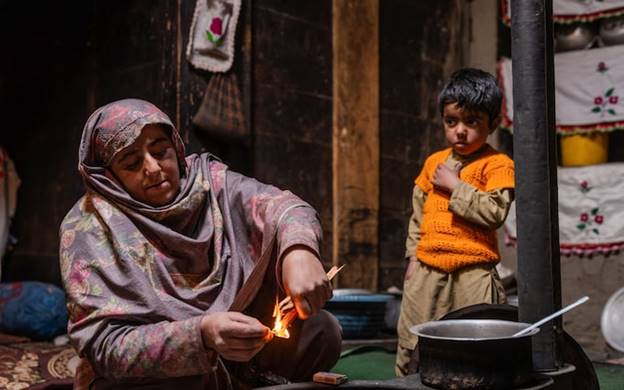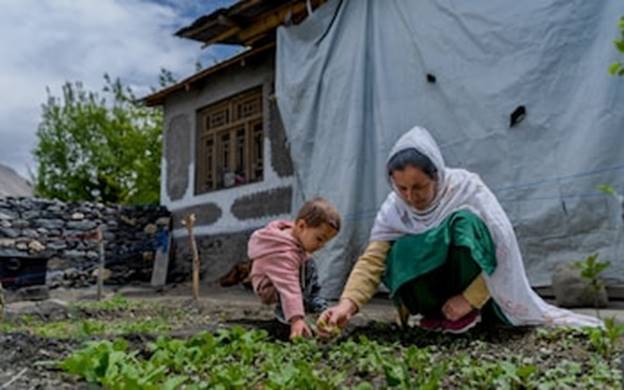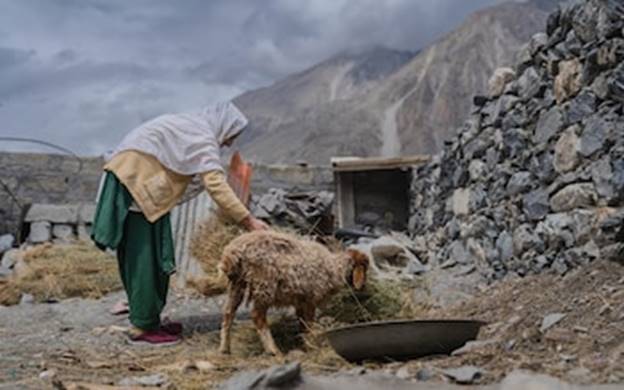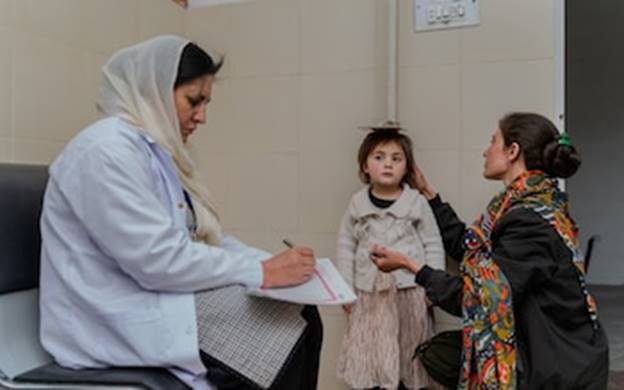

Hafiz Ur Rehman, pictured with his mother Nasira Wali, was born with severe acute malnutrition and is a beneficiary of the Central Asia Stunting Initiative - Arsalan Haider/AKDN
Breaking the Hunger Cycle in the Mountains of Northern Pakistan
By Harry Johnstone
Nasira Wali is snapping pieces of Juniper wood in the dim light of her living room. She places the kindling on the open fire. Soon the flames lick. Her veiled face glows. She heats up some milk.
It is a heart-warming moment, but Nasira’s situation is pretty bleak. Her family is trapped in a cycle of hunger. In her village and throughout the far north of Pakistan, it requires an extraordinary effort to break it.
Nasira’s four-year-old son, Hafiz, sits beside his mother. He stares at the ground for several minutes. When he was about nine months old, Nasira says, he began crying every night, his skin turned “white” and his hands and feet began to swell.
“When he couldn’t sleep,” she says, “I couldn’t sleep. Seeing my baby like that…I was so anxious.”
Nasira and her family live in a village called Immit, which lies on the southern slopes of the great Pamir mountain range.
Outside Nasira’s house, there are a few green, terraced fields of wheat, potatoes and onions, lined with apricot and apple trees.
Shimmering willows and poplars offer shade. It could appear idyllic, but the reality is far from it: 136,000 children under five in Gilgit-Baltistan – 46 per cent of that age group – are stunted.

Jamjur Naroz with her son Kaleem outside their home - Arsalan Haider/AKDN
“We are a poor family,” says Jamjur Naroz, another mother I meet in Immit. Her house is half-constructed, with grey tarpaulin sheeting protecting the front door.
Jamur’s husband works as a laborer, earning £3 a day. This is the family’s total daily income.
“We cannot afford a balanced diet,” she says.
Their son Kaleem was too weak to breastfeed properly as a newborn. Today, aged two and a half, he is both stunted and underweight.
Serious undernutrition has life-changing consequences. When both mother and child don’t consume nearly enough macronutrients (proteins, carbohydrates, and fats) or micronutrients (vitamins and minerals) during the pregnancy and breastfeeding period, children like Hafiz and Kaleem are physically impaired for life.
Severe undernourishment hinders their physical development, which includes, of course, their brains. They are more likely to face poverty later in life. Their children could then easily suffer the same fate. This is why nutrition experts talk about an intergenerational cycle of hunger.

Jamjur’s son Kaleem, who suffers from stunting, is receiving treatment from the Central Asia Stunting Initiative - Arsalan Haider/AKDN
The International Fund for Agricultural Development (IFAD) is trying to break this cycle by tackling poverty by bolstering farming in northern Pakistan.
IFAD’s Economic Transformation Initiative (ETI) is enlarging farmer smallholding sizes. It has established over 160 cooperatives for more than 40,000 farmers.
Cooperatives are crucial to farmers’ development. Sharing grain stores lowers costs, while greater collective output enables farmers to negotiate better prices.
Cooperatives help farmers access better information, finance, and markets. These benefits can increase returns and production.
The ETI has also embarked on a massive infrastructure project. Across the mountains of Gilgit-Baltistan, IFAD has built over 430 km of irrigation channels and 380 km of farm-to-market roads. “It is a huge and herculean task,” says IFAD’s Khadim Saleem, who coordinates the ETI project.
Pakistan’s government is leading efforts to break the hunger cycle in the region and nationally.
Mohammad Abbas, project director at the Department of Health in Gilgit-Baltistan, refers to the government’s national cash transfer scheme, known as the Benazir Income Support Program (BISP), among others.
Launched in 2008, the monthly cash vouchers of between $15 and $20 are sustaining some of Pakistan’s poorest.
The scheme is working: between 2011 and 2019, the percentage of BISP beneficiaries below the poverty line fell from 90 to 72 percent, according to a World Bank evaluation published this year.
Prosperity begins with the food we eat
Yet while the BISP has succeeded in tackling poverty in this northern region, the program is quite a blunt instrument; more targeted interventions are also required.
In a treatment room of the health clinic in Immit, Gulsherran Mohdsadik is slipping a measuring tape around Urwa Hussain’s left arm.
Gulsherran positions the four-year-old girl on some scales. She then measures her height and the data is recorded in a book.
Gulsherran is supporting Urwa as part of the Aga Khan Development Network’s (AKDN) Central Asia Stunting Initiative (Casi).
Three years ago, Urwa was stunted. Luckily, however, she was on the Casi books.
The Casi team educated her parents on breastfeeding techniques, complementary feeding, dietary diversity, and hygiene. They provided a nutritional supplement called Ronaq for a full year and monitored her growth each month.
Over the past three years, her height and weight reached the average centile for her age. Today, she is thriving.

Syeda Urwa is weighed and measured during a routine health check-up - Arsalan Haider/AKDN
Since 2019, Casi has been tackling undernutrition in nearly 450 of the most remote mountainous regions of Pakistan, Afghanistan, and Tajikistan.
Teams of nutritionists are sweeping through the valleys, speaking to villagers, assessing their health status, raising awareness of better feeding practices, and, where necessary, donating high-nutrition supplementary feeding products.
The overall results are positive: where Casi operates in Gilgit-Baltistan, in just five years since the project began, the prevalence of stunting among children under five has dropped from 41 to 35 percent or just over one in three, according to an Aga Khan University evaluation. The fall in stunting is happening faster than the global average, based on UNICEF data.
But despite these programs, so many families continue to fall through the cracks.
Nasira’s son, Hafiz, for example, suffers from anemia so severe that he can’t concentrate, so he can’t go to school. He has gastric issues, so he can’t easily eat.
Nasira has to give her son medication like Trimetabol, to treat his lack of appetite and digestion problems. He wears a leather amulet containing verses from the Qur’an and his parents pray for him.
As I write this, after my time in Pakistan, I wonder what Hafiz’s future could have been.
If only he and his mother had been able to eat properly in those early years when she was pregnant and for a year or two after his birth. Perhaps, I reflect, he could have gone on to study engineering, medicine, or law. He could have supported his family and his community.
He could have pursued his dreams.
Our dream should be a world where no family has to survive on £3 a day; where all of us can thrive. It starts with the food we eat.
(This article was supported by the Aga Khan Development Network . - The Telegraph)

